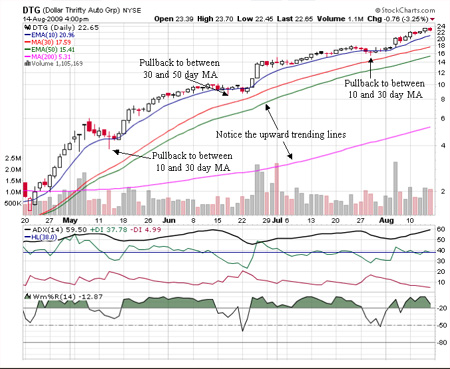What is a swing trade in stock trading
Swing trading attempts to capture gains in a stock or any financial instrument within an overnight hold to several weeks. Swing traders use technical analysis to look for stocks with short-term price momentum. These traders may utilize fundamental or intrinsic value of stocks in addition to analyzing the price trends and patterns.
The trader must act quickly to find situations in which a stock has the extraordinary potential to move in such a short time frame. Therefore, swing trading is mainly used by at-home and day traders.

Large institutions trade in sizes too big to move in and out of stocks quickly. The individual trader is able to exploit such short-term stock movements without having to compete with the major traders.
Swing trading involves holding a position either long or short at least overnight and or up to several weeks. The goal is to capture a larger price move than is possible on an intra-day basis. Swing trading assumes a larger price range and price move and therefore requires careful position sizing to minimize downside risk.
Swing trading can involve a mix of fundamental and technical analysis. Swing trades usually rely on larger time frame charts including the minute, minute, daily and weekly charts.
Swing trades tend to require more holding time to generate the anticipated price move. The distinction between swing trading and day trading is the holding position time. Swing trading involves at least an overnight hold, whereas day trading closes out positions before the market close.

Day trading positions are segmented to a single day only. Swing trading involves holding for several days to weeks. By holding overnight, the swing trader incurs the unpredictability of overnight risk resulting in gaps up or down against the position.
By undertaking the overnight risk, swing trades are usually done with a smaller position size compared to day trading, which utilizes larger position sizes usually involving leverage through day trading margin. Swing trading on margin can be extra risky in the event a margin call triggers. A swing trader tends to look for multi-day chart patterns.
Introduction To Swing Trading
Some of the more common patterns involve moving average crossovers , cup-and-handle patterns, head and shoulders patterns , flags, and triangles. Key reversal candlesticks , such as hammers for reversal bottoms and shooting stars for reversal price tops, are commonly used in addition to other indicators to devise a solid trading game plan.
Stop-losses tend to also be wider when swing trading to match the proportionate profit target.
What Is Swing Trading? Is It The Best Trading Strategy?
Dictionary Term Of The Day. A measure of what it costs an investment company to operate a mutual fund. Latest Videos PeerStreet Offers New Way to Bet on Housing New to Buying Bitcoin?
This Mistake Could Cost You Guides Stock Basics Economics Basics Options Basics Exam Prep Series 7 Exam CFA Level 1 Series 65 Exam. Sophisticated content for financial advisors around investment strategies, industry trends, and advisor education.
Swing High Swing Low Swing Swing Option Swing For The Fences Day Trader Pattern Choppy Market Reversal. Content Library Articles Terms Videos Guides Slideshows FAQs Calculators Chart Advisor Stock Analysis Stock Simulator FXtrader Exam Prep Quizzer Net Worth Calculator.

Work With Investopedia About Us Advertise With Us Write For Us Contact Us Careers. Get Free Newsletters Newsletters. All Rights Reserved Terms Of Use Privacy Policy.